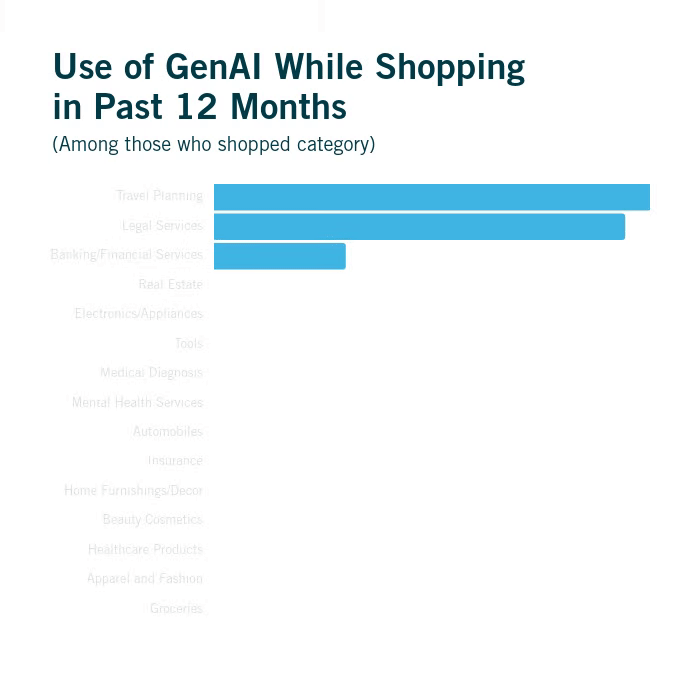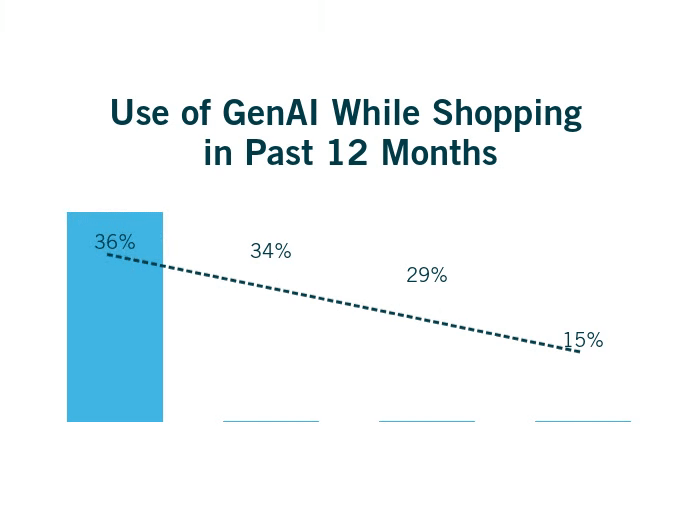
Accelerating the Shopper Journey with GenAI
Understanding GenAI’s role in shaping modern shopper behavior
by James Sorensen
For most people, making decisions has never been easy—especially when decisions involve high risk or complexity. But when it comes to making major purchases, today’s shoppers have a resource that previous generations never had:
Generative AI.
As researchers and marketers, we strive to understand the “journeys” that shoppers take as they move toward purchase decisions. Without a doubt, GenAI is now a part of the journey for millions of shoppers. It’s changing how people shop and how they approach spending—especially for riskier or more complex purchases. With that said, let’s take a closer look at how, when, and why GenAI factors into modern shoppers’ decision-making processes. Understanding how GenAI impacts and influences the decision-making process allows us to better structure strategy, communications, and innovation around these emerging behaviors.
Fast Facts

Faster journeys—from product research to purchase decision—typically result in more purchases; this has always been one of our “universal truths” of retail research. In other words, when retailers (and brands) help consumers find what they want more quickly, consumers are more likely to make a purchase—and they often buy more. That’s important because GenAI is helping shoppers make decisions faster, according to our recent study.
While only 27% of U.S. consumers we surveyed have used GenAI for shopping, nearly 82% of this group say GenAI has made their shopping journey faster.
To put it simply, GenAI saves shoppers time by reducing cognitive load at key stages of the shopper journey. Obviously, this is a huge insight for marketers. But, as the numbers suggest, it’s not necessarily the norm for all purchases. Let’s consider the distinction.
Critical, Not Universal (yet!)

It’s no secret that some purchase decisions are largely automatic; they don’t require any critical thought as part of the decision-making process. Other purchases are slow and calculated, often requiring days or weeks of research.
According to Burke’s research, GenAI is most likely to be used when making these more complex, time-consuming purchase decisions—e.g., vacations, legal / financial services, or a home purchase. These are high-risk, complex decisions where GenAI serves as a heuristic or short cut to help ease cognitive load. In contrast, GenAI is rarely used on less complex, habitual, or low-risk purchases like groceries, apparel, OTC healthcare, beauty, or home-décor products.
All or Nothing
But when consumers do use GenAI for a big purchase, interestingly, they tend to use it at all stages of their journey.
How GenAI was used when shopping:

And even though, GenAI acts primarily as a tool to mitigate friction, reducing time spent on large purchases, the rapid expansion of the technology almost guarantees a ubiquitous presence in the future of retail—especially for Gen Z shoppers, who are already driving the growth of GenAI. As Gen Z’s purchase-power increases, so will their reliance on GenAI across the spectrum of their purchase behaviors.

Just Trust Me
In order to support the growth of GenAI as a key component of the shopper journey, GenAI platforms, retailers, and brands need to address the “trust deficit.” While some customers avoid GenAI because they prefer to interact with a human or lack knowledge on GenAI and how it works, many say they avoid using GenAI due to concerns of data privacy (highest among boomers) or because they don’t trust the information being provided (highest among Gen Z).
| Total | Gen Z | Millenial | Gen X | Boomers/Silent | |
| Prefer a human | 45% | 41% | 35% | 45% | 51% |
| Don’t know how/never use AI platforms | 38% | 30% | 38% | 35% | 42%* |
| Concerns about personal data | 29% | 19% | 26% | 23% | 38%* |
| Don’t trust AI to provide unbiased recos | 27% | 35%* | 22% | 27% | 28% |
| AI has errors / makes inaccurate recos | 13% | 22%* | 16% | 10% | 12% |
| I avoid technology | 5% | 3% | 6% | 2% | 8% |
| AI platforms provide me too many choices | 3% | 6% | 3% | 4% | 3% |
Obviously, bridging this gap in trust is critical. And those who ignore this important step, will find themselves left behind as GenAI becomes more and more entrenched within the retail landscape.
Implications for Marketers
To put the changes we’re facing in perspective, AI is already displacing regular search engines by helping shoppers reduce cognitive load. This change in behavior will add an additional layer for marketing messages to penetrate. Marketers, particularly those in complex decision-making categories, need to begin to shift their digital strategy now.
As marketers begin to adjust their strategies keeping these recommendations in mind can help ensure success:
- AI Proof Digital Content – Ensure your content is informative / relevant, while maintaining a conversational tone. Use clear and concise language with schema markup code to help AI search engines better understand your content.
- Build Trust – Retailers and GenAI platforms should offer summarized reviews to build trust / confidence (42% of shoppers in Burke’s study indicate they would use if available on future shopping experiences) and contribute guest posts to reputable blogs.
- Expand Distribution – Build direct-to-consumer databases / CRMs and leverage direct-email marketing. Share your content across social media platforms to reach a broader audience.
By following these strategies, you can improve your chances of being prominently featured in AI-driven search results, which broadens your brand’s visibility and reduces consumer friction points, ultimately driving a boost in sales volume.

James has been studying shoppers since 1993—first as part of the pioneering Sorensen Associates, the in-store research company, and then as part of the Kantar Retail Consulting practice. James now serves his clients as the retail and shopper insights expert at Burke.
Interested in reading more? Check out James’ other articles:
Recent ECommerce Growth May Not Last
As always, you can follow Burke, Inc. on our LinkedIn, Twitter, Facebook and Instagram pages.
Source: Feature Image – ©insta_photos – stock.adobe.com
Footnote: *Burke’s study was fielded among 1,200 representative US consumers in June and July 2024.
Burke, Inc. (June-July 2024). Burke Omnibus Survey.








